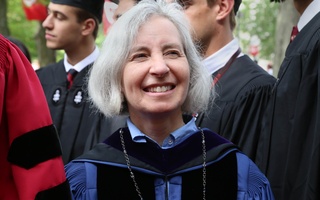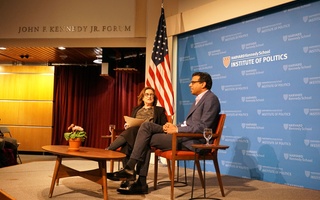When Kennedy School of Government Dean David T. Ellwood ’75 steps down at the end of the academic year, the school may lose one of its most potent fundraising assets.
In a February interview, Ellwood said he expected fundraising to “inevitably slow down” once the new dean comes on board, explaining that since the “vast majority of [HKS’s] money comes from people who aren’t even Harvard graduates,” philanthropy is based on confidence, trust, and long-term relationships that could be interrupted or stalled by the transition.
{shortcode-bac1ef6bb03a5e47c895df116fca915808caaf87}
“I would be very surprised if our fundraising pattern didn’t slow down some in the next few years,” Ellwood said. “So it’s one of the reasons that it seemed...important for me to stay through this year—[I] want to make sure we are in very good shape.”
As of this February, the Kennedy School had raised $383 million toward its $500 capital campaign goal.
Kennedy School Executive Dean John A. Haigh credits Ellwood with bringing financial stability to the school in the wake of the dot-com bust through “aggressive management activities to both generate incremental revenue and to manage [HKS’s] structure effectively.”
“One of things that personally I take pride in, and I think David does too, is that we have run surpluses on what we refer to as our unrestricted budget every year since David has taken over as dean,” Haigh said. “We’ve been able to build up significant research programs and research balances from a funding perspective which enables our faculty to conduct their research in a way most comfortable to them.”
Charles J. Haight, senior associate dean of alumni relations and resource development at the Kennedy School, said he was not sure if a “recalibration” in response to Ellwood’s departure would necessarily result in a drop of donations, emphasizing also that the capital campaign’s goals extended beyond dollars raised.
“The notion that campaigns just raise money I think is wrong, because campaigns also raise awareness and enable us to engage important constituencies—such as alumni,” Haight said. “We think of alumni activity as a whole, including giving. Making gifts is not an outcome of engagement but, indeed, another element of engagement, whether the donor is an alum or not.”
One of Ellwood’s major contributions in his 10 years as dean, according to his colleagues at the Kennedy School, has been establishing a solid financial future for the school. Ellwood also said he personally considers the increase in financial aid at the Kennedy School, from $11 million to $23 million annually during his tenure, as his biggest achievement.
“Dean Ellwood is just a great dean in all of kinds of ways, but he’s certainly truly distinguished in the area of attracting philanthropic support to the Kennedy School,” Haight said.
Officials have not named Ellwood's successor.
—Staff writer Luca F. Schroeder can be reached at luca.schroeder@thecrimson.com. Follow him on Twitter @lucaschroeder.
Read more in University News
O’Malley Discusses Possible Presidential Run, Economic RevitalizationRecommended Articles
-
Mixed SuccessOne of the primary functions of the largest fundraising effort in higher education history must be to make sure the opportunities Harvard affords are more broadly available than ever before.
-
Authors Discuss Extreme Poverty At HKS TalkAuthors of the book “$2.00 a Day: Living on Almost Nothing in America” called for the creation of public sector jobs at the lowest levels of the economy and shared their insights on extreme poverty in America at the Kennedy School on Tuesday.
-
 Law School Alumni Confident in Capital Campaign
Law School Alumni Confident in Capital Campaign -
 Kennedy School Completes Campus Renovations
Kennedy School Completes Campus Renovations -
 Gawande Speaks on Addictiveness of Opioids at IOP: 'I Had No Idea'
Gawande Speaks on Addictiveness of Opioids at IOP: 'I Had No Idea'













